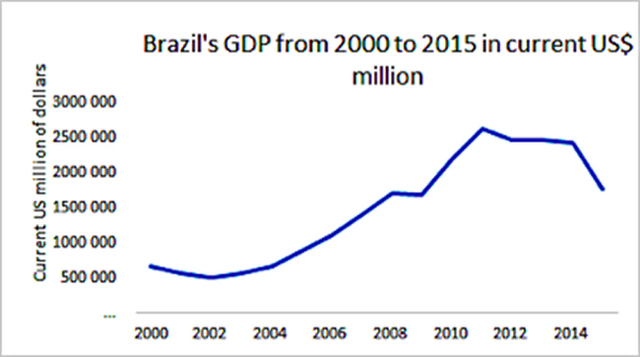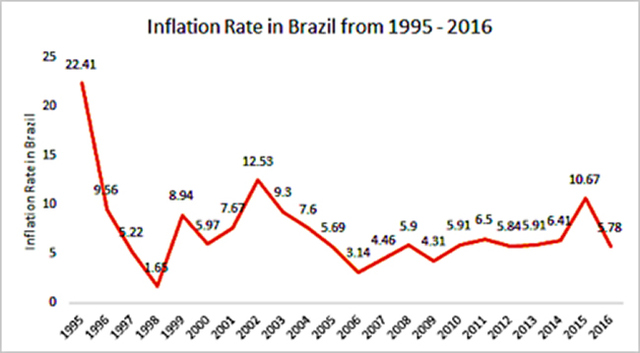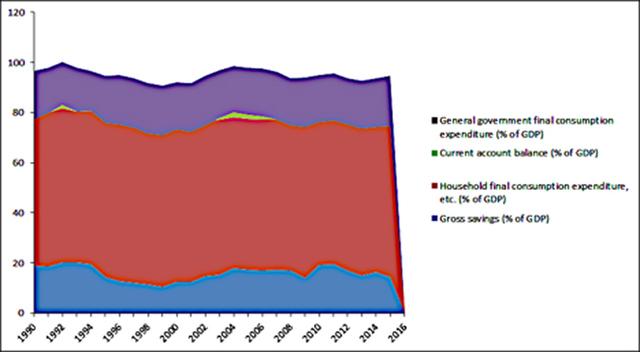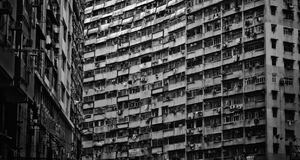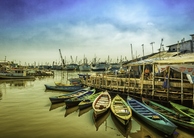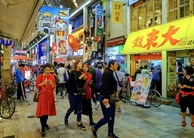From Clocks and Clouds VOL. 7 NO. 2How Have Corruption Scandals and President Roussef's Impeachment in Brazil Impacted its Economy?
By
Clocks and Clouds 2017, Vol. 7 No. 2 | pg. 1/1
IN THIS ARTICLE
KEYWORDS
AbstractIn 2009, Brazil was in the path to become a superpower. Immune to the economic crises of 2008, the country's economy benefitted from the commodity boom, achieving a growth rate of 7.5 per cent in 2010, when Rousseff was elected. A few years later, nonetheless, Brazil's boom turned into an economic bust. In 2014, the largest corruption scandal in its history denounced the involvement of major politicians, including then-President Rousseff, in schemes of money laundering. In this essay, I analyze the impacts of such scandals and Rousseff's impeachment on the Brazilian economy. I argue that these two events contributed indirectly to Brazil's economic instability, as they shone a light on larger structural problems such as unemployment and high public expenditures. Looking at the future, I conclude by discussing the challenges that face Temer's administration. IntroductionOn October 8, 2016, I was sitting at the Wilson Center listening to Brazil's current finance minister, Mr. Henrique Meirelles, suggest that the ongoing financial crisis in Brazil is as severe, if not worse, than the Great Depression. As I looked around the room, everyone's faces looked puzzled, worried, hopeless. The accumulation of lower commodity prices, corruption, impeachment, and inflation present in the last four years have shaken the Brazilian economy severely. Prices have skyrocketed, investors have fled, unemployment increased, and stagnation has arrived. In this paper, I analyze two specific factors that contributed to the chaotic economic situation in Brazil: the corruption scandals involving the state-owned company Petrobras and the subsequent impeachment of President Dilma Rousseff. I argue that these two events indirectly contributed to the economic situation of the country as they magnified the political instability in Brazil. To support my argument, I start by analyzing the political rise of Dilma Rousseff. Then I discuss the momentum she received in 2010 from the economic boom and the Lula years. After giving a background on Rousseff's debut as President of the Republic, I provide a detailed explanation of the Car Wash Operation since its start in 2009. Lastly, I analyze the political and economic consequences that the corruption scandal brought to Brazil, including Rousseff's impeachment. I conclude by discussing the challenges that face Temer's administration. The Rise of Dilma RousseffDilma Rousseff's debut as a Brazilian politician did not start in the twenty-first century as many would argue. Much earlier than that, in 1964, sixteen-year-old Rousseff served as a militant for the VAR-Palmares, an armed revolutionary organization that fought against the military dictatorship in Brazil. This organization, influenced by Debray's Revolution in the Revolution and Fidel Castro's success in Cuba, found an answer for Brazil in Marxism. However, in a repressive far-right military regime, VAR-Palmares lacked political rights. In 1970, Rousseff was arrested in São Paulo under charges of subversion. Condemned to six years in prison, Dilma lost her political rights. Her body still carries scars from the torture she experienced at the Tiradentes prison (Amaral, 2011). Once released from prison, Rousseff met Leonel Brizola, an iconic figure in Brazil's political history, with whom she founded the Democratic Labour Party, or PDT (G1, 2016). Her involvement with the PDT coined her official debut in a legally recognized political organization. Through the PDT, Rousseff was elected Porto Alegre's Municipal Finance Secretary between 1985 and 1988. In 1989, she became director general of Porto Alegre's City Council under the administration of Alceu Collares. In 1991, Collares appointed Rousseff as the president of the Foundation of Economics and Statistics, where she served until being elected the state's Secretary of Energy, Mines and Communications in 1993 (Amaral, 2011). A few years later, Rousseff's trajectory with the Worker's Party (PT) would begin. In 1998, she helped PT-candidate for state governor Olivio Dutra to win an election in Rio Grande do Sul. By then, Rousseff's de facto affiliation had turned from the PDT to the PT – a fact confirmed later that year when she left PDT after the party decided to break with the PT. In 2001, Dilma's preference for the Worker's Party went viral. In 2003, President Luiz Inácio Lula da Silva appointed Rousseff as his Minister of Mining and Energy (Amaral, 2011). In the same year, Rousseff became the President of the Board of the Directors of Brazil's largest oil and state-owned enterprise (SOE), Petrobras. She presided over the SOE's board for seven years, resigning in 2010 to run for Brazil's presidency (Tavares, 2016). Two years after being nominated Minister of Mining and Energy, Rousseff had proven to be a firm, competent politician who could handle Brasilia quite well. Lula, impressed by her skills and desperate to find a replacement for his Chief of Staff Jose Dirceu, who was caught in the mensalão, the largest corruption scandal of Brazilian political history until then, fell on her. In Rousseff, he found a friend and the fuel needed to reset Brasilia's engine. In 2005, Lula appointed Dilma as his newest Chief of Staff. He trusted her not only to manage Brazil's ministries, but also two of his administration's major programs. The first, "Minha Casa, Minha Vida," (my house, my life) promoted affordable housing for those living in poverty in Brazil. The second, "Programa de Aceleração de Crescimento" (growth acceleration program, also known as PAC), provided an economic stimulus package with investment projects in Brazil. This program was particularly responsible for increasing Rousseff's reputation, as Lula proudly entitled her the "mother of the PAC" (Amaral, 2011). As Chief of Staff, "mother of the PAC," and Lula's protégé, Rousseff became the Worker's Party strongest candidate for the 2010 elections. Running her campaign on the motto "for Brazil to keep changing," Rousseff won the runoff with 56.95% of the votes (Savarese and Bencke, 2016). Rousseff Gains MomentumThe 2010 elections served as a referendum on Lula's administration. The election of Dilma Rousseff confirmed the public approval of the programs and policies implemented by the Worker's Party. It also confirmed Brazil's oblivion toward corruption and the people's excitement towards the years to come. Brazilians were proud to have elected their first female President, but most importantly, they were eager to continue benefitting from a strong economy. Brazil's economy reached a 24-year peak in 2010. The economy grew 7.5 per cent, unemployment kept low at 5 per cent (see figures 3 and 5), and the Brazilian Real was at its strongest rates since the implementation of the Real Plan (see appendix, Fig. I). In addition, as Besta points out, 2010 " saw the highest increase in monthly incomes of Brazilians at 1490.61 Brazilian real ($893.4), up 19 percent compared with levels in 2003. Per capita income was up 5.5 percent in 2010 compared with 2009" (2011). These numbers, subsequents of other factors like commodity prices boom and the discovery of Brazil's pre-salt, convinced Brazil's new middle-class, children of the cash transfer program Bolsa Familia, that reelecting the Worker's Party would serve them well. Rousseff's reelection thus served as a referendum on the Lula years and an engine to catalyze Brazil's potential overseas. Both the media and academia shared their excitement to see Brazil's future, as they wrote about the country as the 21st century superpower. In the end of 2009, The Economist cover announced "Brazil Takes Off" (The Economist, 2009). In 2010, Peter Hakim published his book entitled "Brazil on the Rise" (Hakim, 2010) and Forbes released an article suggesting "Brazil's Economy Catches Its Breath" (Delgado, 2010). Following this route of excitement, Dauvergne and Farias wrote a well-known piece called "The rise of Brazil as a Global Development Power" in 2012 (Dauvergne and Farias, 2012). These, among other publications, reflected the projections created for Brazil's economic path: a path to be of success, development, growth, power, independence, and global influence. The first years of Rousseff's administration were filled with momentum to see Brazil step into the role of global leader. However, the end of 2013 served as presage to a large group of politicians, including Lula and Rousseff, that the years to come would not be so glorious. The economy had stagnated with an annual growth of 0.9 per cent (see figure 3) and the June 2013 protests demonstrated the population's dissatisfaction with the Worker's Party administration. With more than 2 million people taking over the streets, they protested against rampant increases in bus fares, inflation, corruption, and lack of investment in education and infrastructure. By the end of the year, the media that had responded so positively to previous PT years started to question Brazil's direction. One year away from the World Cup, the international press doubted whether Brazil was ready to host the global event (Vanegas, 2013). In September 2013, The Economist asked "Has Brazil Blown It?" Investment companies, such as Morgan Stanley, published reports suggesting that Brazil's golden economy was "a tale from the emerging world" (The Economist, 2013). 2014 and The Car Wash Operation2014 arrived with many surprises. For some, 2014 was the year of excitement as Brazil would host the World Cup. For others, 2014 was the year of despair. On one side, the Public Prosecutor's Office (MP) and the Federal Police (PF) discovered what has become the largest corruption scandal in the history of Brazil. On the other side, the stagnation of the economy and the discontent with the government brought a sense of hopelessness that spread among Brazilians across all socioeconomic classes. In 2014, an expansive investigation performed by the Public Prosecutor's Office was disclosed. Initiated in 2009, the Car Wash Operation, named after a network of gas stations and car washes that to managed illicit resources pertaining to a criminal organization in Brazil, investigated a Federal Deputy from the state of Paraná, accused of money laundering (MPF, 2016). The MP also investigated Alberto Youssef, a black market dollar dealer who was already familiar to the Federal Police. In 2013, telephone interceptions monitored conversations among several dollar dealers in order to obtain further information on the criminal organizations charged with money laundering (MPF, 2016). In July of that year, the Police learned about Youssef's car donation to a former Director of Petrobras, Paulo Roberto Costa (MPF, 2016). This discovery led the Police to suspect that these criminal organizations' network for money laundering was larger than ever thought. The investigations did not only involve politicians who had previously been involved in this kind of corruption scandals, but they also involved businessmen and contractor companies across the country. As the Federal Police, along with the Public Prosecutor's Office, denounced the dimension and severity of the Car Wash Operation, the economy reacted in despair. The first phase of the Car Wash investigations happened in March 2014. In this phase, the Police along with the MP arrested 17 people, including dollar dealer Alberto Youssef and former Director of Petrobras, Paulo Roberto da Costa (MPF, 2016). Since then, political and economic turmoil arose in Brazil as the Operation would discover more people involved every single day. In April 2014, the scandal had escalated so deeply that a Parliamentary Inquiry Commission (CPI) on Petrobras was installed in the Senate to address issues pertaining solely to the corruption revealed in the Car Wash Operation (G1, 2016). In June, already in its fourth phase, the investigations revealed that most of the money laundered had been deposited into bank accounts in fiscal havens, such as Monaco and Switzerland. Among the owners of these accounts was Paulo Roberto da Costa (Borges, 2016). When invited to testify about the issue, nonetheless, Costa became known as a whistleblower. Speaking under a plea bargain, Costa explained how the laundering schemes worked. In addition, as he denounced major players in these schemes, he cited the involvement of President Dilma Rousseff (Borges, 2016; MPF, 2016). By September 2014, the Car Wash Operation confirmed that part of the money laundering was illegally used to fund 2010 political campaigns from major parties, including Rousseff's PT and VP Michel Temer's PMDB (Borges, 2016). By the end of the year, the Operation had reached the seventh phase, arrested 39 people, and investigated four major Brazilian contractor companies: OAS, Odebrecht, Camargo Correa, and Queiroz Galvão (Borges, 2016). Even though 2014 came to an end, the political and economic turmoil present in Brazil continued to worsen. The economic indicators were not showing an optimistic scenario. In 2014, the economy grew only 0.1 percent while inflation reached 6.41 percent (see figures 2 and 3). Talks about a recession dominated the news, while frustration dominated people's conversations about the government. Mistrusting the Worker's Party administration, Brazilians feared that the 6.8 percent unemployment rate would skyrocket (Borges, 2016). In addition, as the dollar continued to quickly appreciate, they feared that the bust after the boom had arrived. The same media outlets that had partaken in Brazil's exhilaration around 2010 now expressed their woes. The Economist published "Why Brazil Needs Change" (The Economist, 2014) followed by "Brazil In a Quagmire" (The Economist, 2015). The Independent article said "It's Chaos in Brazil but don't panic" (Herbert, 2014) while Bloomberg announced early in 2015 "The Betrayal of Brazil" (Smith et al, 2015). 2015 and Instability RisesDespite the Car Wash Operation and the frustration brought with it, the corruption scandal did not compromise the Worker's Party leadership. In November 2014, Dilma Rousseff was re-elected president after a runoff against the Brazilian Social Democracy Party (PSDB) candidate Aécio Neves with 51.6% of the votes (G1, 2014). Even though the Car Wash Operation did not compromise the Worker's Party ability to re-elect Rousseff as President in 2014, the scandal and the economic despair dominating Brazil at the time alarmed Brasilia that instability was on the rise. Early in January 2015, then President of Petrobras, Graça Foster, suggested that the company had lost R$ 88,6 billion due to the Car Wash Scandal (G1, 2015). In February, a former manager of operations of Petrobras revealed that the Worker's Party had received somewhere between US$ 150 to US$ 200 million in one bribery contract (MPF, 2016). A few months later, as the investigation reached its twelfth phase, Folha de São Paulo, a renowned newspaper in Brazil, published an interview with Ricardo Pessoa, a contractor CEO who claimed that his company had donated R$ 7.5 million to Dilma Rousseff's reelection campaign (MPF, 2016). A famous saying in Brazil says that those who search for something, will eventually find it. This proverb was reiterated throughout all of the MP's investigations in 2015. The more the Car Wash Operation searched for corruption schemes, the more names it found and the more complex the network of money laundering actors was revealed to be. In 2015 alone, the investigation had fourteen phases, arresting more than forty people, condemning more than twelve, and recovering more than R$870 million (G1, 2016). Through these operations, the presidents of contractor companies such as Odebrecht were arrested. Politicians such as former Presidents of Brazil Fernando Collor and Luiz Inácio Lula da Silva, then-Presidents of the House and of the Senate, Eduardo Cunha and Renan Calheiros, respectively, and former Chief of Staff José Dirceu were denounced for being involved in major money laundering schemes. If anything, 2015 was the year that shook Brasilia. Brazil's political "crème de la crème" was shaken. Most parties were involved; every politician was pointing fingers. The German newspaper Die Zeit compared the political intrigues in Brazil to those in House of Cards (Fischermann, 2016). In addition to the political turmoil, economic instability also emerged. Economic indicators demonstrated that the economy had contracted by 3.8 per cent in 2015, while inflation had escalated to 10.67 per cent (see figures 3 and 4). The Brazilian Real had been severely depreciated as the exchange rate against the US dollar appreciated to 3.95943 (see appendix, Fig. I). Unemployment reached 9 per cent, the highest level in the last four years (see figure 5). Likewise, the federal debt also broke the administration's record reaching almost R$ 2 trillion (see appendix, Fig. III). In tandem, the political and economic instability that dominated Brazil in 2015 set the tone for drastic changes in the year to come. 2016 and Rousseff's FallThe economic and political instability present in Rousseff's second term extended to 2016 as well – so much so that her presidency was compromised. The Car Wash Operations continued to investigate major networks of politicians and contractor companies involved with Petrobras and its money laundering schemes. By the time this paper was written, The Public Prosecutor's Office, along with the Federal Police, has established 1,397 procedures, conveyed 654 searches and seizures, 77 preventive arrests, 92 temporary arrests, and 6 in flagrante delicto. The Operation has received 52 criminal charges against 254 people for crimes of corruption, drug-trafficking, formation of criminal organization, and money laundering (MPF, 2016). These crimes refer to briberies that sum up to approximately R$ 6.4 billion, of which R$3.1 billion are to be recovered. Up to December 2016, the Car Wash Operation has condemned 118 people, accounting for more than 1,256 years of prison in total (MPF, 2016). Different from the previous two years, nonetheless, the findings on the Petrolão compromised the Worker's Party administration like never before. As major members of the Party were arrested and indicted of money laundering crimes, Brazilians grew disillusioned with their political leadership. Just like in June 2013, the population returned to the streets demanding Rousseff to leave her office. Economic mismanagement caused inflation to increase to 10.7 per cent, and unemployment to reach 11 per cent. Tired of corruption and frustrated with the lack of investments in the country, people demanded change. In May 2016, the Senate opened the process of impeachment against Rousseff. According to jurists Janaina Paschoal, Hélio Bicudo, and Miguel Reale Jr., Rousseff had violated the Fiscal Responsibility Law (G1, 2016). They claimed she had authorized R$2.5 billion of additional expenses between July and August 2015. According to the Law, such authorization could not have happened since government expenditures did not match the fiscal goals for the year, especially since the administration was committed to increase its savings to pay the public debt (G1, 2016). Rousseff was also charged for borrowing money from other federal institutions such as the Central Bank and the Brazilian Development Bank (BNDES) to finance her government's social programs in 2015, as cash transfer Bolsa Familia and Plano Safra (G1, 2016). This is known as a "fiscal pedal" in Brazil, as the government seeks to disguise a breakdown in the public accounts. However, as the judges highlighted, "fiscal pedals" infringe the Fiscal Responsibility Law, which forbids the government from borrowing money from public banks that are under the Executive branch (G1, 2016). With Rousseff temporarily removed from office for three months, Rousseff's VP, Michel Temer, was put in charge of the interim presidency. Forbes reported that for the first time since 2009, Brazil's current account went into surplus. The market reacted positively with an appreciation of the Brazilian Real (Rapoza, 2016). As Temer appointed his cabinet, he carefully selected conservative technocrats who would take Brazil to a route much different from that during the PT years. So much so that into two weeks after Dilma's temporary leave, Temer's Finance Minister Henrique Meirelles already proposed cuts of more than 2 per cent of the GDP (Rapoza, 2016). During the interim months, political instability was followed by acute polarization. On one side, scholars, mainstream civilians, politicians, and the press would argue that it was time for Dilma and her crew to go (The Economist, 2016). On the other side, people would argue that Rousseff's impeachment was a political coup orchestrated by the Brazil's Rightist elite. Despite disagreements, the Senate voted 61 to 20 to impeach Rousseff, convicting her of infringing the Fiscal Responsibility Law. Then-interim head of state, Mr. Michel Temer took over Brasilia, where he will preside until 2018 (Romero, 2016). Impacts on the EconomyMeasuring the economic impacts of the Car Wash Operations as well as Rousseff's impeachment is not an easy task. An anonymous officer at the Brazilian Embassy in Washington DC suggested that the consequences brought by the economic and political instability in Brazil could by no means be quantified. For her, "the corruption scandal in Brazil removed the cork from the bottle. It served to shine light on larger structural obstacles that the country already faced both economically and politically." While I agree with the officer's argument that Brazil's de facto struggle refers to structural issues rather than corruption alone, I disagree that the economic impacts of the Car Wash Operation, as well as the impeachment, cannot be quantified. In this section, I will address the economic indicators that I personally monitored at the Embassy of Brazil, as well as some scholarly arguments, as an endeavor to measure the impact of both events on the Brazilian economy. The Car Wash Operation contributed to the economic and political instability present in Brazil, but it was not the protagonist factor. The Operation, with the help of the press, was able to reveal the expansive network of corrupted politicians across Brazil. Such revelation did not give room for people's political complacency. For the first time, a corruption scandal compromised political parties and their members. In this way, the corruption scandal contributed to the political instability in the country. In addition, the scandal also played a role impacting the economic instability in Brazil. As corruption schemes and political instability were revealed to the public, investments decreased severely. Compromising Brazil's credibility, the Car Wash Operation and the impeachment spillovers detracted foreign investment. As Figure 1 shows, from 2014 to 2016, FDI decreased by almost US$20 billion. Moreover, domestic investments also decreased. The continuous increase in the interest rate has prevented investors from borrowing money (see appendix, fig. IV), and the involvement of major contractor companies in the corruption scandals have left no one to work on big infrastructure projects in the country. According to consultancy firm Tendências, domestic investments shrunk 6 per cent in 2016 alone (Ribeiro and Cortez, 2016). Besides investments, the Car Wash Operations as well as the impeachment impacted Brazil's GDP. Figures 1 and 2 demonstrate how the economy shrunk since 2013. Figure 2 in particular show how the economy contracted, thus taking the country into a severe recession. Alessandra Ribeiro, from Tendências, has argued that the Petrolão is a factor that potentialized the contraction of the GDP. For her, two out the 3.8 per cent decline in economic growth relates back to the scandals (Ribeiro and Cortez, 2016). A decline in economic activity came in tandem with a rise in inflation as well as in the unemployment rate. In this case, the impacts of the two events analyzed might be indirectly related, nonetheless still present. The mismanagement of the economy has caused inflation to reach almost 11 per cent in 2015. This inflation, followed by the lack of investments, and the decline in economic activity may have decreased the number of jobs available in the market. Figures 4 and 5 show the price fluctuation as well as the unemployment rate in the last years. For Bruno Lavieri, "blaming the Car Wash Operation [for unemployment and stagnation] is like blaming the doctor for finding his patient's disease." However, as GO Associates have argued, this indirect impact of the investigations have costed more than 2 million jobs in two years due to the lack of infrastructure projects with Petrobras and contractor companies (UOL, 2016). Petrobras alone composed 13 per cent of the economic activities in Brazil (Petrobras, 2016). According to Getúlio Vargas Foundation, "the decrease in Petrobras' activities due to the Car Wash Operations could take away R$7 billion from the economy, lead to the loss of more than 1 million vacancies and a R$ 5.7 billion fall in the collection of taxes by the Union, states and municipalities in 2015" (UOL, 2016). Figure 5: Unemployment rate of persons 14 years or older from 2012 to present in Brazil. Source: IBGE Although the impeachment and the corruption scandal did not singlehandedly cause Brazil's economic recession, they shone a light on major existent structural problems such as corruption, fiscal pedals, lack of investments, and poor allocation of resources. Moreover, both events indirectly contributed, even though did not cause, the economic crisis. The corruption scandal influenced the decline in economic activities and lack of investments in the country, which subsequently increased the unemployment rate. In addition, inflation became rampant and political instability remained. With that, government expenditures increased and private savings decreased significantly, as Figure 6 reveals. Figure 6: Composition of Brazil's GDP in terms of private consumption, current account balance, government expenditure, and private savings. Source: World Bank Data ConclusionWith Michel Temer's administration comes new challenges. Foreign and domestic investors remain skeptical of Brazil's economic and political situation. Unemployment and inflation remains high, investments remain low, and the Brazilian Real continues depreciated. Since his inauguration, Temer dedicated most of his time and effort to get Bill 241 approved in Congress. This Bill proposes to reduce public spending and to balance the public accounts by freezing government expenditures in the next twenty years (Alessi, 2016). However, getting Bill 241 approved is not everything. President Temer will have to address several other factors such as Social Security and Tax reforms, unemployment rate, social 49 agenda, and Congress polarization to be able to recover from the economic and political instability that the Car Wash Operations shone a light to. AuthorFlávia Bedicks is a student of Economics and International Studies. She graduates in May of 2017. College of Arts & Sciences (CAS) and School of International Service (SIS), American University. Email: fb4631a@american.edu References"A Lava Jato Em Números – Caso Lava Jato". 2016. Ministério Público Federal. http://lavajato.mpf.mp.br/atuacao-na-1a-instancia/resultados/a-lava-jato-em-numeros-1. Alessi, Gil. 2016. "Entenda O Que É A PEC 241 E Como Ela Pode Afetar Sua Vida". El País. http://brasil.elpais.com/brasil/2016/10/10/politica/1476125574_221053.html. Amaral, Ricardo Batista. 2011. A Vida Quer É Coragem. 1st ed. Rio de Janeiro: Primeira Pessoa. Banco Central do Brasil (BACEN). 2016. Indicadores Econômicos. Brasília: Banco Central do Brasil. Besta, Shankar. 2011. "Brazil Unemployment Drops To Record Low In 2010". International Business Times. http://www.ibtimes.com/brazil-unemployment-drops-record-low-2010-260209. Borges, João. 2016. "Linha Do Tempo – Lava-Jato". Cbn.Globoradio.Globo.Com. http://cbn.globoradio.globo.com/grandescoberturas/operacao-lava-jato/2016/02/23/LINHA-DOTEMPOLAVA-JATO.htm. "Brazil In A Quagmire". 2015. The Economist. http://www.economist.com/news/leaders/21645181latin-americas-erstwhile-star-its-worst-mess-early-1990s-quagmire. "Brazil Takes Off". 2009. The Economist. http://www.economist.com/node/14845197. "Brazil / U.S. Foreign Exchange Rate". 2016. FRED. https://fred.stlouisfed.org/series/DEXBZUS. "Cálculo Havia Apontado Perda De R$ 88,6 Bilhões, Segundo Graça Foster". 2015. Globo G1. http://g1.globo.com/economia/negocios/noticia/2015/01/calculos-havia-apontado-perda-de-r886-bilhoes-segundo-graca-foster.html. Dauvergne, Peter, and Déborah BL Farias. 2012. "The rise of brazil as a global development power." Third World Quarterly 33 (5): 903-17. Delgado, Bertrand. 2010. "Brazil's Economy Catches Its Breath". Forbes. http://www.forbes.com/2010/09/08/brazil-economy-gdp-opinions-columnists-doctor-doom.html. "Dilma É Reeleita Presidente E Amplia Para 16 Anos Ciclo Do PT No Poder". 2014. Globo G1. http://g1.globo.com/politica/eleicoes/2014/noticia/2014/10/dilma-e-reeleita-presidente-eampliapara-16-anos-ciclo-do-pt-no-poder.html. "Dívida Pública Federal, STN". 2016. Tesouro Nacional: Ministério da Fazenda. http://www.tesouro.fazenda.gov.br/divida-publica-federal. Fischermann, Thomas. 2016. "Brasilien: Intrigen Wie Bei "House Of Cards"". Zeit. http://www.zeit.de/politik/ausland/2016-03/brasilien-opposition-dilma-roussef-luiz-inacio-luladasilva. Hakim, Peter. 2010. "Brazil on the rise: The challenges and choices of an emerging global power." Politica Externa 19 (1). "Has Brazil Blown It?". 2013. The Economist. http://www.economist.com/news/leaders/21586833-stagnant-economy-bloated-state-andmass-protests-mean-dilmarousseffmust-change-course-has. Herbert, Ian. 2014. "World Cup 2014: It's Chaos In Brazil – But Don't Panic". The Independent. http://www.independent.co.uk/sport/football/international/world-cup-2014-itschaosin-brazil-but-dont-panic-9210299.html. "IBGE: Instituto Brasileiro De Geografia E Estatística". 2016. Ibge.Gov.Br. http://www.ibge.gov.br/home/estatistica/indicadores/precos/inpc_ipca/ipca-inpc_201610_3.shtm. "Linha Do Tempo Da Lava Jato". 2016. G1. http://especiais.g1.globo.com/politica/2015/lavajato/linha-do-tempo-da-lava-jato/. "Linha Do Tempo – Caso Lava Jato". 2016. Ministério Publico Federal. http://lavajato.mpf.mp.br/atuacao-no-stj-e-no-stf/linha-do-tempo/todas-noticias. "Lula Está Certo Ao Dizer Que Lava Jato Afeta Economia? Analistas Avaliam". 2016. UOL Economia. http://economia.uol.com.br/noticias/redacao/2016/04/03/lula-esta-certo-ao-dizerquelava-jato-afeta-economia-analistas-avaliam.htm. "Participação Do Setor De Petróleo E Gás Chega A 13% Do PIB Brasileiro". 2016. Petrobras. http://www.petrobras.com/pt/magazine/post/participacao-do-setor-de-petroleo-egaschega-a-13-do-pib-brasileiro.htm. "Processo De Impeachment É Aberto, E Dilma É Afastada Por Até 180 Dias". 2016. Globo G1. http://g1.globo.com/politica/processo-de-impeachment-de-dilma/noticia/2016/05/processo-de-impeachment-e-aberto-e-dilma-e-afastada-por-ate-180-dias.html. Rapoza, Kenneth. 2016. "Global Investors Put Brazil's Interim President Michel Temer On Notice". Forbes. http://www.forbes.com/sites/kenrapoza/2016/06/02/global-investors-putbrazilsinterim-president-michel-temer-on-notice/2/#7797e89e5f36. "Relembre A Trajetória Política De Dilma Rousseff". 2016. G1 Política. http://g1.globo.com/politica/processo-de-impeachment-de-dilma/noticia/2016/05/relembre-trajetoriapoliticade-dilma-rousseff.html. Ribeiro, Alessandra and Rafael Cortez. 2016. "Riscos Para A Recuperação". Tendências Consultoria. http://www.tendencias.com.br/news.cgi?id=114. Romero, Simon. 2016. "Dilma Rousseff Is Ousted As Brazil'S President In Impeachment Vote". The New York Times. http://www.nytimes.com/2016/09/01/world/americas/brazil-dilmarousseffimpeached-removed-president.html. Savarese, Maurício and Carlos Bencke Bencke. 2016. "Dilma É Eleita Primeira Mulher Presidente Do Brasil". UOL. http://eleicoes.uol.com.br/2010/ultimas-noticias/2010/10/31/dilma-eeleitaprimeira-presiDente-mulher.jhtm. Smith, Michael, Sabrina Valle, and Blake Schmidt. 2015. "The Betrayal Of Brazil". Bloomberg. http://www.bloomberg.com/news/features/2015-05-08/brazil-s-massive-corruption-scandalhasbitterness-replacing-hope. "Tales From The Emerging World". 2013. Morgan Stanley. https://www.morganstanley.com/public/Tales_from_the_Emerging_World_Fragile_Five.pdf. Tavares, Monica. 2016. "Dilma Deixa Conselho Da Petrobras". O Globo. http://oglobo.globo.com/economia/dilma-deixa-conselho-da-petrobras-3036516. "Time To Go". 2016. The Economist. http://www.economist.com/news/leaders/21695391-tarnishedpresidentshould-now-resign-time-go. Vanegas, Maria. 2013. "Is Brazil Ready To Host The World Cup? A Look At South America's Most Stable Economy". Latin Times. http://www.latintimes.com/brazil-ready-host-world-cuplooksouth-americas-most-stable-economy-133187. "Why Brazil Needs Change". 2014. The Economist. http://www.economist.com/news/leaders/21625780-voters-should-ditch-dilma-rousseff-and-elect-cio-neves-why-brazilneedschange. "World Bank Indicators, Brazil". 2016. World Bank Data. http://data.worldbank.org/country/brazil. AppendixFigure I: Price of US dollars in Brazilian Reais from 2011 to Present. Source: FRED Figure II: Brazil's Public Debt in R$ millions from 2002 to 2016. Source: Tesouro Nacional Figure IV: Brazil's monthly Interest Rate levels from 2014 to 2016. Source: BACEN Suggested Reading from Inquiries Journal
Inquiries Journal provides undergraduate and graduate students around the world a platform for the wide dissemination of academic work over a range of core disciplines. Representing the work of students from hundreds of institutions around the globe, Inquiries Journal's large database of academic articles is completely free. Learn more | Blog | Submit Latest in Economics |


